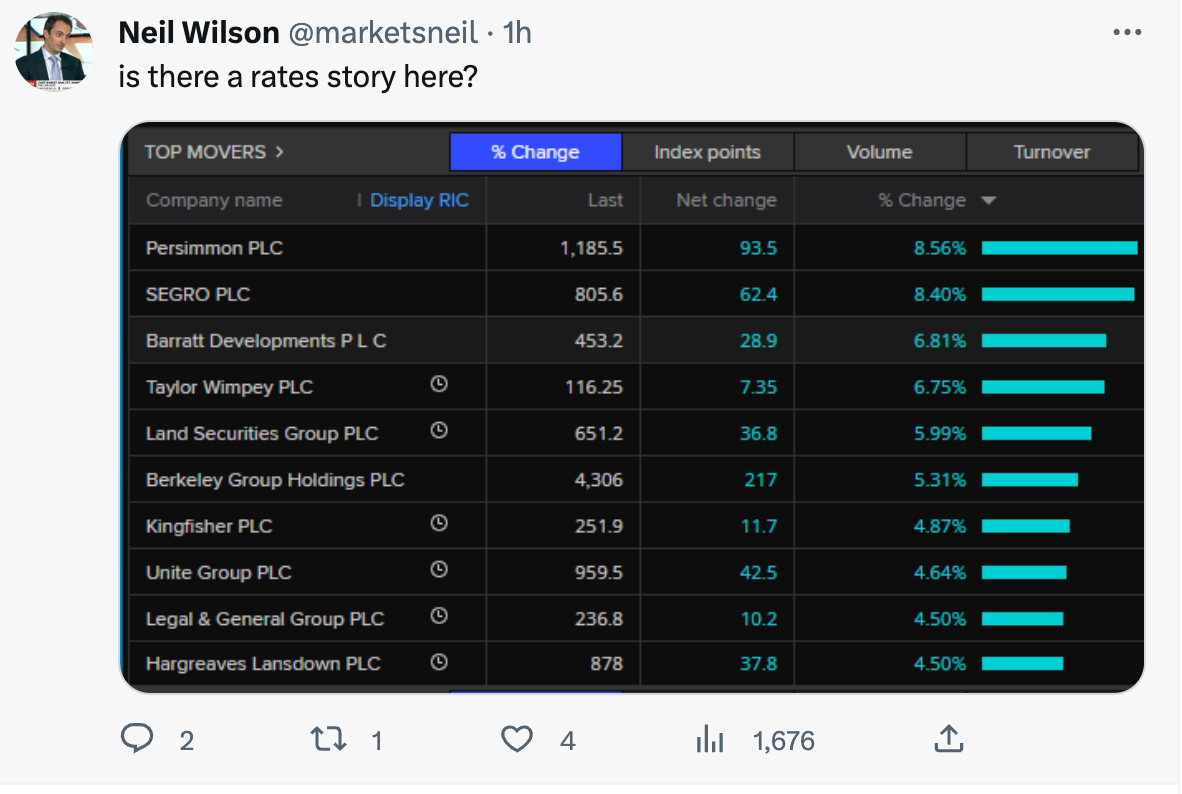Hello and welcome to the latest Off to Lunch…
Today there is positive news to share about the UK economy. Firstly, inflation fell more than expected in June, which has led to a significant bounce in financial markets. Secondly, Tata Group, the owner of Jaguar Land Rover, has confirmed that it will build a gigafactory in Somerset, which will produce batteries for electric vehicles. Tata will invest more than £4 billion in the project and create 4,000 jobs.
Let’s look at inflation first. New data released today shows that the consumer price index came in at 7.9 per cent for June, down from 8.7 per cent in May and below the 8.2 per cent forecast by economists. Core inflation, which strips out categories prone to short-term fluctuations such as food, energy, alcohol and tobacco, was 6.9 per cent. This is down from 7.1 per cent last month. Economists had expected core inflation to stay at 7.1 per cent.
Inflation has been dragged down by falling fuel prices for drivers and food prices going up slower than they were, according to the figures from the Office for National Statistics, which you can find here.
The market reaction has been significant. Traders are now betting that the Bank of England will not have to raise interest rates as much as feared - potentially not even to 6 per cent despite recent suggestions that they could hit 6.5 per cent. The base rate is currently 5 per cent.
The FTSE 100 is up more than 1.5 per cent with companies that are influenced by interest rates enjoying a bounce. This includes housebuilders, which have been hit by potential buyers struggling with high mortgage rates. The FTSE 250, which has more UK-focused companies, is up 3 per cent…
Here is some of the reaction:
James Smith, development markets economist at ING, has provided a neat summary of what the Bank of England may now do at its next meeting in August:
Is this enough to convince the Bank of England to opt for a 25bp rate hike in August? We think it probably will – but it's going to be a close call. The Bank will also be looking at the recent wage data, which was stronger than expected but came alongside figures showing a renewed cooling in the jobs market and improvements in worker supply. The risk is that the BoE applies a similar logic to that seen in June. This could mean that if it expects to hike again in September, then it might as well opt for a larger 50bp hike in August. We certainly wouldn’t rule this out.
The second piece of good news is the announcement that Tata will build a gigafactory in the UK. This announcement has been expected for some weeks. Jaguar Land Rover is the biggest car maker in the UK and if it didn’t build a gigafactory here then frankly there was not much hope for the future of the automotive industry. However, Spain seems to have been considered as a genuine alternative. Unsurprisingly, Rishi Sunak has welcomed the announcement. He held talks with Tata chairman Natarajan Chandrasekaran about the project…
You can find the government’s announcement on the gigafactory here. The government has not yet revealed the incentives offered to Tata to build the factory in the UK. It is saying: “Details of government support to Tata Sons will be published in due course as part of our regular transparency data.” The Financial Times has reported that Tata was looking for up to £500 million of support. Story here
Battery production is expected to start at the factory in 2026. Alongside the UK’s other gigafactory in Sunderland, which is led by Envision and Nissan, the future of the UK automotive industry now has solid foundations. The government says that the gigafactory near Bridgwater in Somerset will provide nearly half of the battery production that the UK needs by 2030.
If you combined this new gigafactory with the government’s announcement yesterday that £20 billion has been set aside for a collection of new nuclear power plants, potentially including smaller reactors developed by Rolls-Royce, then you have the makings of an industrial strategy…
Other stories that matter…
1. Amazon wants to turn Ford’s old engine plant in Bridgend, Wales, into a big data centre, according to reports in Wales. The factory was closed in 2020. More here
2. England cricketer Stuart Broad has reopened his pub in Nottinghamshire a year after it was damaged by fire and says he now wants to open more pubs. Broad has given an interview to the Leicester Mercury here. Sticking with local investments by high-profile figures: the Issa brothers, who own Asda, have got planning permission to build a new dental and medical complex in Blackburn, Lancashire. Story here
3. A collection of businesses and organisations based in northern England have proposed an industrial strategy for the region. The organisations involved include Lloyds Bank, the Northern Powerhouse Partnership and TheBusinessDesk.com. The proposals include creating four accelerator hubs to support promising businesses, policy and regulatory reform to attract investment from UK institutions, and building a new small nuclear power station in West Cumbria. You can find the Invest North report here
4. The Wall Street Journal has done a big piece on the battle to rent a home in London. “Bidding Wars Get Weird in One of World’s Hottest Rental Markets” is the headline. The piece says that up to 80 people are trying to rent each property and potential tenants are being asked to write personal statements that explain why they want to live there. Piece here. The Office for National Statistics says that rental prices in the UK are at a record high and have increased 5.1 per cent year-on-year, the biggest annual rise since records began in 2016. Data here
5. UK employees are spending more time working from home than other European countries. However, working practices in the UK are similar to the US and Australia, while Canadian employees spend more time at home. Times story here
6. OpenAI, the parent company of ChatGPT, has agreed a deal with the American Journalism Project to provide $5 million of funding to local media outlets in the US to experiment with AI technology. The deal is the latest example of how OpenAI is trying to partner with media companies amid concerns in the industry that AI technology could breach their copyright. Axios story here
7. Tesla is scheduled to publish its latest quarterly results tonight in the US. Ahead of that, The Economist has published a fascinating piece on how the company has grown and disrupted the automotive industry since it was founded in 2003. The piece is a reminder of the long, hard slog that Tesla faced - between 2003 and 2011 it made just 1,650 electric vehicles. Having disrupted the car industry, Tesla is now becoming more like it, the piece says, which you can read here. It is refreshing to read about Tesla away from the bravado of Elon Musk
8. Tom Hayes has pointed out an interesting connection between his Libor-rigging case and the wrongful conviction of Post Office workers, one of the biggest miscarriages of justice in UK legal history. The point from Hayes, who has won the right to appeal his conviction for rigging Libor, raises interesting questions for the legal system…
You can hear more from Tom Hayes in our Business Studies podcast episode with him here
And finally…
It was on this day last year that temperatures cleared 40C in the UK for the first time ever. Much of the Northern Hemisphere is experiencing another heatwave today. Temperates in Phoenix, Arizona in the United States have been above 110F (43.3C) for 19 days in a row, which is a new record for a US city, exceeding the 18-days set in 1974 in Phoenix…
Meanwhile, in Manchester, where the fourth men’s Ashes test has started, it is forecast to rain over the next few days…
Thanks for reading. If you enjoy Off to Lunch then please share it with others and spread the word. If this newsletter was shared with you then please sign-up below to become a member, get Off to Lunch sent directly to your inbox, and contribute to the work of Off to Lunch
Best
Graham














